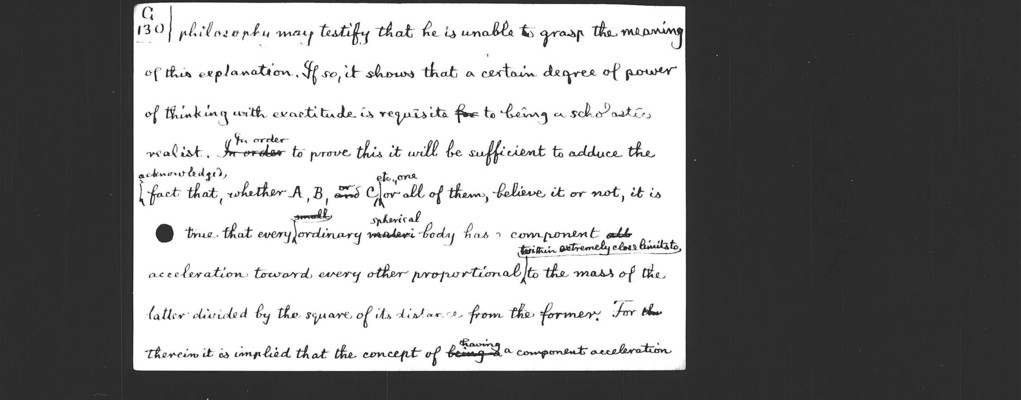Pages
116
G130
philosophy may testify that he is unable to grasp the meaning of this explanation. If so, it shows that a certain degree of power of thinking with exactitude is requisite to being a scholastic realist. In order to prove this it will be sufficient to adduce the acknowledged fact that, whether A, B, or C, etc., one or all of them, believe it or not, it is true that every ordinary spherical body has a component acceleration toward every other proportional within extremely close limits to the mass of the latter divided by the square of its distance from the former. For therein it is implied that the concept of having a component acceleration
117
G131
of that general description, whatever men may think, governs the concept of the motion of such a body, and thereby governs the material spherical body itself. Of course, flaws may be picked in my statement, with which I have taken no particular pains, because such cavils are obviously irrelevant. It is more important that the law may not be exactly true, although it is known to be true within extremely close limits. But even if its truth should be subject to a certain very minute probable error, and the reality of the dominance of the concept should thus be limited, as the Tychist holds the reality of all
118
G132
existents to be, it still remains real in some measure. Now the doctrine of scholastic realism neither is that all concepts are real (which would be the ne plus ultra of absurdity) nor that any concept is perfectly real; but that some concepts are real in some measure. The form of a predicate, as "heavy," for which I prefer to substitute that rheme, or blank form of proposition which becomes a proposition, however nonsensical, as soon as each blank is filled by a designation of [a] sample object whether it be by a familiar proper name, or by a well known individual series such as "____ is heavy," or "The velocity of ____ undergoes an acceleration in amount ____ and in the direction ____." A subsidiary form of expression of a concept is a hypostatic abstraction, such as "weight" or "acceleration."
119
G133
A subject of a proposition is that which in a proposition fills a blank of a rheme. It is a symbol which virtually describes sufficiently or insufficiently some mode of obtaining an index of a single object, to which the predicate of the proposition applies. Thus, "Any normal man loves some woman," tells the interpreter that any designation of whatever object he may pick out, provided it be a normal man, may, as being within the meaning of the proposition, be taken as its first subject; while an object insufficiently described as "a woman" will be the object referred to by its second subject or, in grammatical phrase, as its direct object.
120
G134
Any categorical proposition is equivalent to the combined assertion of a conditional proposition and of an assertion of the identity of the objects of two terms, one in the antecedent and the other in the consequent of the conditional proposition. Thus, the conditional proposition "If there be a man there is something that sometimes sleeps," together with the assertion of the identity of the subject of the consequent with the subject of the antecedent, make up the entire meaning of "Whatever man there may be sometimes sleeps."




